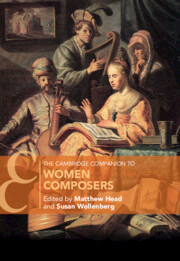Book contents
- The Cambridge Companion to Women Composers
- Cambridge Companions to Music
- The Cambridge Companion to Women Composers
- Copyright page
- Dedication
- Contents
- Figures
- Music Examples
- Contributors
- Acknowledgements
- Abbreviations
- Prologue
- Part I Themes in Studying Women Composers
- 1 Historical Women Composers and the Transience of Female Musical Fame
- 2 In Search of a Feminist Analysis
- 3 Composing Women’s History
- 4 Progress and Professionalism
- 5 Women Composers and Feminism
- Part II Highlighting Women Composers before 1750
- Part III Women Composers circa 1750–1880
- Part IV Women Composers circa 1880–2000
- Bibliography
- Index
- References
1 - Historical Women Composers and the Transience of Female Musical Fame
from Part I - Themes in Studying Women Composers
Published online by Cambridge University Press: 23 May 2024
- The Cambridge Companion to Women Composers
- Cambridge Companions to Music
- The Cambridge Companion to Women Composers
- Copyright page
- Dedication
- Contents
- Figures
- Music Examples
- Contributors
- Acknowledgements
- Abbreviations
- Prologue
- Part I Themes in Studying Women Composers
- 1 Historical Women Composers and the Transience of Female Musical Fame
- 2 In Search of a Feminist Analysis
- 3 Composing Women’s History
- 4 Progress and Professionalism
- 5 Women Composers and Feminism
- Part II Highlighting Women Composers before 1750
- Part III Women Composers circa 1750–1880
- Part IV Women Composers circa 1880–2000
- Bibliography
- Index
- References
Summary
Amidst debates of the early 1880s about the status of women in music, the English organist and scholar Stephen S. Stratton delivered a self-avowed ‘polemical’ paper at the 7 May 1883 meeting of the Musical Association.1 Entitled ‘Woman in Relation to Musical Art’, the talk included a list of women composers ‘drawn from many sources’ and compiled, he said, ‘as evidence that women have been engaged in composition for a longer period of time, and in more branches of the art, than is generally supposed’. Stratton’s ‘list’ consists in 389 names of mostly verifiable historical women dating back to the trobairitz Beatrix, Countess of Dia (twelfth century), each annotated with an approximate date of birth and the genres in which they had composed.2 Where Stratton unearthed this remarkable trove of information he does not say, although as co-author of the then forthcoming British Musical Biography (1897), he may well have been culling pre-existing reference works for information.3
- Type
- Chapter
- Information
- The Cambridge Companion to Women Composers , pp. 19 - 35Publisher: Cambridge University PressPrint publication year: 2024

